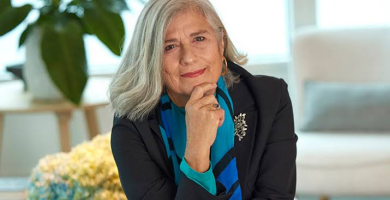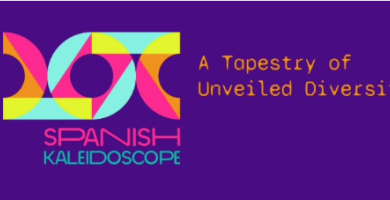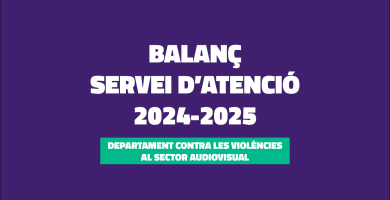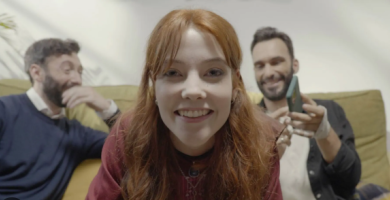
ROSA VERGÉS: "Films, as well as being good or doing well, must be appropriate for the time. And it’s a risk if you’re ahead of your time."
This month we interviewed the director Rosa Vergés. We talked with her about her career in the world of film, her profession and her future projects, including her podcast with Jordi Bertrán, La mirada curiosa, which you can listen to on CaixaForum+.

When you received the Honorary Gaudí award in 2024, you mentioned that at home they told you that you were always very fond of films. Were you attracted to the idea of making films from a very young age? Did you already know that you wanted to do this?
It’s difficult to say that I was sure, but they did tell me that I was fond of films because what I was most interested in was always connected to the imagination, games, etc. And I recorded radio interviews with my sisters or created scripts with my school drawings. But no... that came later, when you look back and say: “well, look, it was something inside you, you know?” I also had this fantasy that it was real. I didn’t know when I was little, but my mother’s sister was an extremely important actress. She was called Silvia Morgan and she made a lot of films here. Then she married and first she went to live in Italy and then the United States. I didn’t really know her until I knew that I wanted to devote my life to film and I really liked having this connection that I didn’t know about when I was young.
But you couldn’t study film.
At the time you couldn’t study film here. Actually, I did look at the possibility of studying in the Centro Sperimentale in Rome, in Paris, in London. In the end, where you study is closely related to the community you create with the people you’ve studied with. And you often end up staying there to live. And I wasn’t sure about that. So I studied History of Art because there was the possibility of studying the history of film.
And how did you come to devote your career to film?
At the time I already knew that I wanted to devote myself to film, but I didn’t know how to do it. I didn’t have any connections at all, but I started to work on some short films. And in the end, I found work as a directing trainee on a shoot. From then on, step by step, I gradually entered the profession, combining it, by the way, with other jobs because a directing trainee was unpaid. I worked for a few years as a tourist guide travelling around the world, which gave me a great insight into leading a team.
You then did a bit of everything. You gradually progressed up the ladder until you became a director. Did you know that you wanted to direct or was it a process that took you there?
I was sure, but also that in each step I took I wanted to be very good at what I was doing: as a camera assistant, scriptwriter, assistant director, etc. Maybe assistant director is the furthest away from actually directing, although it might seem to be the closest. It’s closer to the responsibility of carrying out a production and running a team, but there was a moment when I knew that I’d arrived.
Was it difficult to make your first film? Did you encounter many difficulties?
I tried to make a short film first, but in the end I had to start with a feature length film because I made a proposal and requested a subsidy to make a short based on a story by Enrique Vila-Matas that’s called Nunca voy al cine (I never go to the movies). I wrote the script with a great writer, Cristina Fernández Cubas. We presented it all in Catalan, but the fact that at the time Enrique Vila-Matas wrote in Spanish was sufficient for the subsidy to be refused. This greatly delayed my first attempt.
The main character, for example, had to be Bigas Luna, who I didn’t know. When you’ve worked a lot as a camera assistant and scriptwriter, you have a very good relationship with actors and technicians and you can take advantage of it to make a short film. And all this came to nothing.
On the other hand, many years after having obtained a grant to write a script, together with Rosa Romero I was lucky to participate in a European Community programme called EAVE, which was for independent producers. This project was one of the 20 that were chosen from all the countries of the European Community. And, indeed, it was too complicated because it was a mediaeval story of love between an Arab and a Christian in the 11th century, and half way through the course we changed and that change gave rise to Boom Boom. It’s funny because I started with the second film.
With this film, you actually won a Goya and it was very popular with audiences. Why do you think it was so successful?
At the time, precisely because film studies hadn’t yet begun (they were just beginning then), with all the preparation involved in a debut feature film, it wasn’t expected to do very well. A first film wasn’t as well received as it might be now, and we chose to make a simple film, a comedy. Also, this wasn’t the genre with the most prestige, because it was considered that it wasn’t a film d’auteur, and also I was brave enough, I think, to put a mulatto girl as the main character, which wasn’t common at the time either. The audience liked it, but it didn’t have the opportunities it deserved. It was only because the film was selected for the Venice Film Festival and was rereleased. It was released on the day the football World Cup began and no one went to see it. It’s become successful over time.
Is it true they said that Tic Tac wouldn’t work because it was a film for children?
Tic Tac was another adventure, because children weren’t taken too seriously as viewers, and it appeared that it was enough with the Disney factory, where we were all trained. I wanted to make a film considering children as they are: very difficult, very sincere and very smart viewers. And it was really difficult for me to convince people, because this film is prior to the worldwide success of Harry Potter, and they told me that children didn’t like magic. And that’s not true. Because in my opinion films, as well as being good or doing well, must be appropriate for the time. And it’s a risk if you’re ahead of your time.
You’ve also been a teacher, among the many other things you’ve done.
It was a debt I thought I had. Since I didn’t have the opportunity to study, I wanted to help the new generations find their path, to make it easier and quicker to learn a trade, to make the path shorter. I was always alongside Josep Maixenchs, the creator of the ESCAC, from the Calasanz Centre and even before. I was also there at the beginning of the audiovisual communication studies at the Pompeu Fabra, then in the Blanquerna, in the Menéndez y Pelayo, etc. Whenever I could and can, I’ve always supported the people starting out.
Your last fiction film, Iris, is from 2004. Haven’t you found any other projects which interest you?
That’s not something you decide. The projects are what they are. I began to write, to do other things and I’ve made more documentaries. And as documentaries are watched much less and have much fewer openings, it’s easy for them to be overshadowed.
Are you working on any audiovisual project at present?
I’ve just finished a podcast on film, La mirada curiosa, for CaixaForum+. And yes, I have a couple of projects at the moment. Also some things related to theatrical productions.
How did the idea of doing the podcast arise?
I’ve always loved radio and I really wanted to collaborate with Jordi Beltran. And it’s true that I always had people around me who said: “With all your knowledge about film, it would be good if you could explain it”. The most stubborn and insistent was my son. So I told him: “All this stuff about podcasts is very difficult”. That’s the first thing that Beltran told me, that if you don’t have a window from which to teach like in the cinema, if you don’t have a possible outlet for what you’re doing, there’s so much that it’s impossible for you to reach the people who’d like what you’re doing.
The CaixaForum+ platform is very interesting: everything they do, how they do it and the contents they have, which are very high quality. And as we wanted to do it well with good sound, recorded in a studio, with original music, etc. It’s true that it was a brilliant experience for the people we interviewed and how we were able to do it.
And what do you want to show about the world of film?
It’s called La mirada curiosa (The curious perspective) because it’s also a question of talking about what doesn’t appear in the frame, what you don’t see in the film, which explains and dignifies each of the professions involved in film. Because as it’s teamwork, each of the parts is equally essential and it was good to be able to talk about these things always with two people related to the profession and Jordi Beltran and I asked half the questions each.
What do you think that you and Jordi can offer?
Jordi has huge experience and when it’s a question of improvising he’s capable of doing it without losing the thread. My experience covers more the part of scriptwriting and knowledge about film. They are two parts and with Jordi I’ve worked on two scripts. We know each other really well and the communication between us was very good and rubbed off on the guests.
How did you select the guests?
In this first season it’s true that it was out of affinity, because I knew them, because I could feel at ease with the people I was interviewing. Because the experience of putting Paco Poch together with Jaume Ripoll from Filmin involves talking about the whole background of how today’s cinema was constructed starting from the cinema that I knew. Putting Abel Folk with Eulàlia Ramon or Teresa Font with José Manuel Pagán... It opens a lot of doors. With Nuria Roldós, who’s now president of the Association of directors of photography AEC, I began when she was also a camera assistant, in her case with the first female gaffer to exist in Spain. They are very random combinations, closely related to our own experience.
Did you first choose the subject and then work on who would be involved and the script?
It was more that I had to write the script in accordance with the people I’d thought of. In this first season, the connecting thread was always what a character does from when the script’s written, they face a casting, they’re dressed, their hair is arranged, they go to the set, they film, they come into contact with other characters. It was like following the connecting thread of a fictional story starting from a character and how they pass through all the stages of the shooting of a film. Above all to explain what a shoot is like.
You talk about the first season. Will there be a second one?
That’s the idea. We’re still discussing it with the platform. Now it’ll be a bit like cinema before cinema and I hope to cover all forms of art. I want to talk about the world of music, literature, painting, sculpture, photography, etc.
Coming back to directing, you’ve done fiction, you’ve made documentaries. Is a fiction film, where maybe you start from your own idea, very different from making a documentary in which you talk about something that you didn’t invent?
In fiction I think you lie in order to tell the truth and in documentaries you come across this truth, but the way of dealing with it can also involve fiction, in so far as you’re giving your point of view, which might not always be objective. You’re always looking at it from a certain perspective. What doesn’t change is the desire... the fact that you have to fundamentally believe what you’re explaining in order to be able to explain it. I can’t create something that I don’t believe in.
You also need to be highly committed in both cases. And to be surrounded by a team: with documentaries, I tend to work with Jordi Barrachina, who’s a great documentary filmmaker. We always say that I contribute what is more the fictional side, which often links the different facts that you’re explaining.
What do you most like about directing?
In fiction I especially like working with actors, because they’re the ones who stand up for you and your stories. I also love the magic of teamwork. Forming part of a team that places its trust in you and being able to take advantage of the talent of so many people at the same time. There’ve been times - when shooting or seeing a set in Tic Tac, for example, or filming in that silence so full of people when you say camera, action - that have moved me. You experience a unique emotion on being able to explain how you see things in the world.
You’ve also filmed a lot in Barcelona. What do you think the city has brought you as a director?
The film in which I most tried to explain what the city represents for me is Souvenir, in which a Japanese amnesiac travels around the city at Christmas. I tried to explain it because it was a time of change, before the Olympics. Barcelona was being transformed and I also felt like I was someone coming from outside to discover it, because it was different. Barcelona... is the people, above all, the people I’ve met. I wanted to explain what we’re like because, in a way, being very sincere with small groups of people you’ve met, you can create works that have a universal interest.
Are you working on any new project as a director?
Yes, a documentary about a guitar and its importance in Barcelona at the beginning of the 20th century. Where guitars were produced and the fact that the most important musicians, like Tárrega and Granados, and then Mompou, took the guitar out of the brothels and flamenco to play it in concerts.









